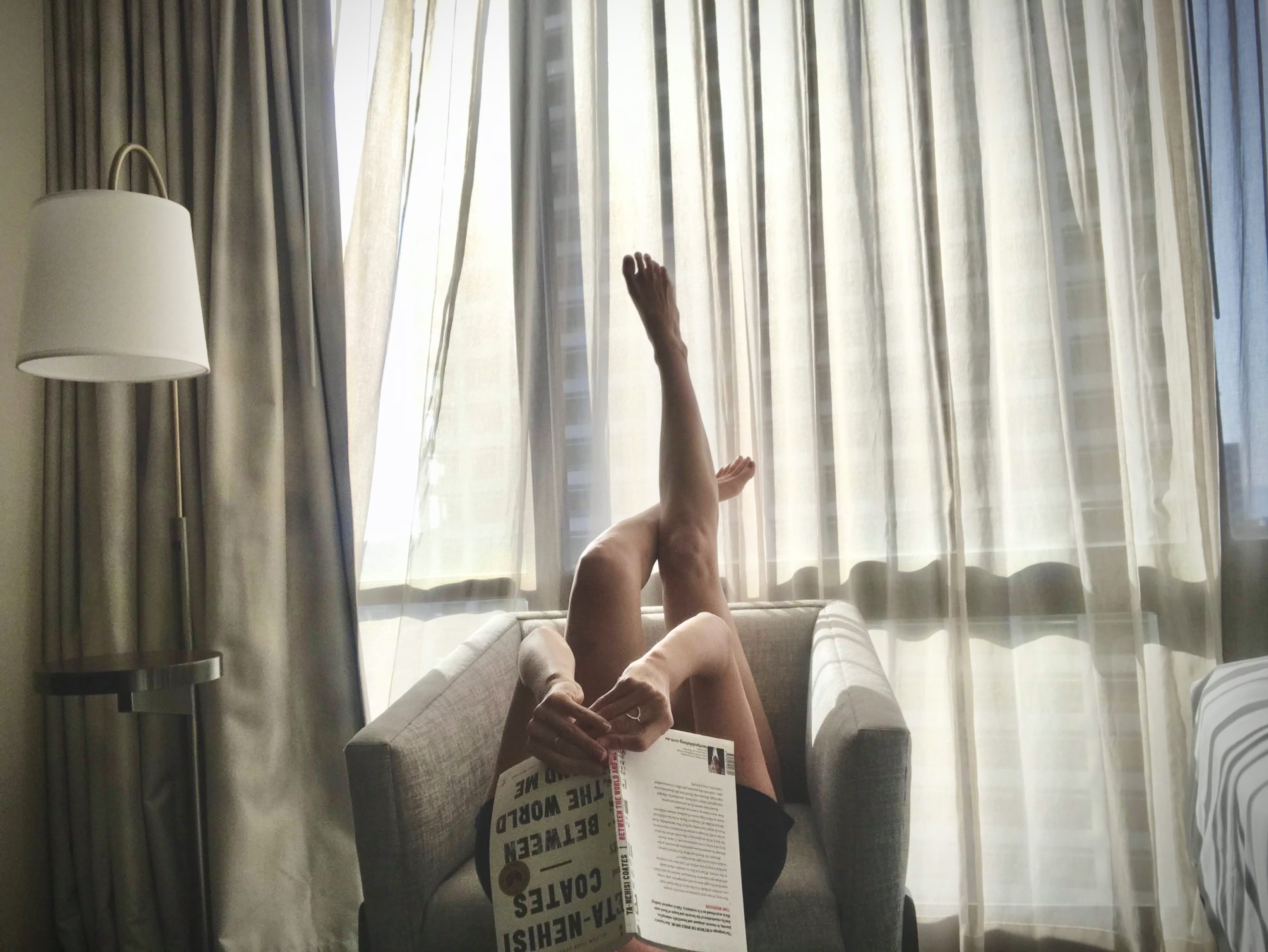
Books and airplanes, reading and vacations, they go together like peanut butter & jelly. Although admittedly, I don’t read as much as I’d like to, I’ve been getting back into it and remembering just how much I love reading.
When I first started my job as a flight attendant, I was cruising through several books a month, always had a “work book”, a “home book”, and often a “beach book”. Since our entire fleet became equipped with Wi-Fi, since I took on coursework for a second degree, since I started a blog, my downtime on the airplane has been converted into pockets of productivity. For the last couple of years, it felt like I couldn’t read for pleasure at all. Like every free moment I had should be put to good use. (Man, do I suffer from The Shoulds.)
Happily, though, this is one of the many things that changed with Coronavirus. I had more time than ever. I was able to take a break from work and from my coursework. I have been savouring the books I’m reading, and the simple action of doing something I enjoy. I’m back to work now, but still finding time to read and still finding myself immersed in the various characters and beautifully-strung sentences.
Thinking this must be somewhat related to #FlightAttendantLife and travel, I decided to put a list together of the books I’ve read over the last few months. I’ve included links to each, which are affiliate links, meaning if you purchase one through my site from Amazon, I get a small commission, despite you paying the same price. If you want to check them out from the library or buy independent, I fully support that too!
So without further ado, and in order of reading, not of favorites, here it is: My COVID reading list.
To Kill a Mockingbird, Harper Lee
“You never really understand a person until you consider things from his point of view… Until you climb inside of his skin and walk around in it.”
I kicked off my 2020 COVID reading list with one of my favorite books of all time. The book that made me want to be a lawyer. That sparked a deep desire for justice—real justice. That opened my eyes to the disparities in our worlds, to racism, and that gave me a treasured fictional character to idolize in Atticus Finch. I saw Atticus Finch as a moral compass for us all. As the embodiment of tempered, logic-bound righteousness. The moral high ground in one man, unyielding respect for the ideals laid out in our constitution. This is one of the reasons I was anxious to read Go Set a Watchman, the sequel/prequel to TKM by Harper Lee. I was scared of knocking down this larger than life symbol I’d come to love.
To Kill a Mockingbird (if you haven’t read it) is a story of adult themes through the eyes of children. It is incredible how much more simply we see things when we get down to this level. Scout, the main character and narrator, tells us of her adventures with her brother Jem, friend Dill, and of the stir in the town surrounding Atticus, her father, for his legal defense of a black man. It is a story of men shifting in the shadows to hide the hate in their hearts from the light of day and the open breeze. Of children coming to learn that adults have created arbitrary categories for men; That have nothing to do with right and wrong. Of finding out that common knowledge and popular opinion are not always aligned with faith or piety, morality or righteousness. Scout learns a lot in this book, but the one of the great takeaways here is that we have much more to learn from children.
If you haven’t read this one in a while, dust it off and jump back in. Soak in nostalgia, get mad with Scout, let your heart break a little, and remind yourself of all these lessons you learned as a child.
Go Set a Watchman, Harper Lee
“As sure as time, history is repeating itself, and as sure as man is man,
history is the last place he’ll look for his lessons.”
Does Go Set a Watchman count as a sequel if it was written before the original “To Kill A Mockingbird”? This book, despite being released in 2015, more than a half-century after the 1960 classic, was Harper Lee’s first novel. It was also the famous novelist’s first rendezvous with the characters of Atticus, Jem, Scout, Aunt Alexandra, and Boo Radley. Lee received editorial advice, upon completing Go Set a Watchman, to try re-creating the story but from the beginning. Make the characters kids. Tell the back story behind the story. And Voila! To Kill A Mockingbird was born, becoming an American Classic that used to this day in many school curriculums.
When Go Set a Watchman was released, it emerged with its fair share of controversy, namely over the fact that Atticus Finch, the hero of nondiscriminatory, letter-of-the-law, do-what’s-right thinking, had become in this update a confederacy-supporting racist. I mean, “States’ rightsman”. I was nervous to get into this book. To tear down the hero I’d held symbolic respect for all these years. But actually, the timing was just right for me to meet the new Atticus.
Just as many of us are coming to see people we know and love supporting policy positions that seem detrimental to our own health, safety, and well-being, to the values we hold dear, so too was Scout, in the book. Growing up with her father, a pillar of the community and a justice-minded man shooting for equality under the law, coming home to find him espousing what she saw as small-minded views, put Scout into a tailspin. A period of questioning everything she knew. How he could have been so good, decent, intellectual and just, and shrunk himself to small, backwoods ideas. Or, perhaps worse, how she could have missed all the signs along the way if this was the true Atticus. How could someone she respected so much be so far from where her own beliefs were?
And while this book, I’m sorry to say, is not nearly as well written as To Kill a Mockingbird, it is worth reading for this reason alone. Because so many of us are experiencing this very quandary in our own lives. Sometimes it’s hard to climb into someone else’s skin. But shouldn’t we try?
Haroun and the Sea of Stories, Salman Rushdie
“Any story worth its salt can handle a little shaking up.”
This book was a pleasant surprise, having never read Rushdie before.
A dip in the nonsensical, yet serving up themes so true and universal. In this book, Rushdie uses made-up words—his own language, almost—creates scenarios from scratch, other worlds that don’t exist, and yet somehow you know exactly what he is talking about every step of the way. It was a delight, getting into this book. The story is of Haroun, and his father, Rashid Khalifa, a great story teller. When Rashid loses his ability to tell stories, when the well of stories runs dry, the two embark on a journey to get his groove back. On the way they encounter armies of cards, gallant but stupid princes, dark forces looking to plug the well, destroy all stories and speech, and a plethora of unforgettable characters.
A look at the serious in the nonsensical.
Of creativity: What is the point of stories that aren’t true? Is any story ever new? Or do they all spring from the universal- “Nothing comes from nothing.”
Of the importance of words, speech, language, but also of reflective silence: “…the dance of the Shadow Warrior showed him that silence had its own grace and beauty (just as speech could be graceless and ugly); and that Action could be as noble as Words; and that creatures of darkness could be as lovely as the children of the light.
Of sharing of resources. Of compromise. Of believing in more than what you can see, of faith: “Africa, have you seen it? No? Then is it truly there?…And the past, did it happen? And the future, will it come? Believe in your own eyes and you’ll get into a lot of trouble”
This is the weirdest book I’m recommending, but does that make it the special-est too?
White Rage, Carol Anderson
“White rage is not about visible violence, but rather it works its way through the courts, the legislatures, and a range of government bureaucracies. It wreaks havoc subtly, almost imperceptibly. Too imperceptibly, certainly, for a nation consistently drawn to the spectacular—”
This is not light, fun reading, not by any stretch. But it is important reading. A book of historical facts. An accurate portrayal of America’s fraught and malicious, guilty and intentional, never-atoned-for history of race. An unraveling of the whitewashed myths of Emancipation, Reconstruction, Brown v. Board—so many of the moments we consider in this country to be “turning points” on our road to redemption. The things that solved our problems with race and cut off our racist roots.
If you attended school in America, whether you are black or white, this book will be an eye opening experience. Anger-invoking perhaps, because you’ll see so many missed opportunities along the way. So many times you could have known the truth and so many times that knowing could have created the appetite for solutions. And at the same time you’ll see the lies you were given instead. The kinder, friendlier version of American racism. The marketing sprayed upon American children to grow the belief that the problems are a past bunch—created by ancient evil-doers and solved by valiant moralists.
None of it is true. But truth is available for the finding and knowing. This is required reading.
Untamed, Glennon Doyle
“When a woman finally learns that pleasing the world is impossible, she becomes free to learn how to please herself.”
If you have not read Glennon Doyle’s Untamed, order a copy today. If you are a woman and have not read Glennon Doyle’s Untamed, get it express shipped.
This book is hard to even describe. A hymn of empowerment. Of looking at cultural norms, and external messaging about who you can be, about how you may have inadvertently taken those messages as truths, may have—knowingly or not—silenced yourself. This book is about getting back to basics. Looking within. Unraveling the messages, and finding the truth—our inner knowing. There are at least 100 Aha! Moments in these pages. Bits of wisdom worth underlining and looking back on later, in case you lose your way again. There is a reason every woman you know is reading and quoting this book.
Reading Untamed is an act of self-care. Truly. I cannot stress enough that every woman, and yes, men too, should read this book.
Between the World and Me, Ta-Nehisi Coates
“Black people love their children with a kind of obsession.
You are all we have, and you come to us endangered.”
This book is a beautiful examination of life as a black man in America. Written as a letter to Coates’ son, it takes the reader through his own life. Childhood in West Baltimore, the fear present and inherent in the streets, the survival instincts needed and honed, the depressing paradox of loving with an iron fist that so many black parents feel obligated to do, the yearning for the American dream portrayed on television in images of white picket fences and white faces. He takes us to HBU Howard University- The Mecca, as he writes, through the unlearning of whitewashed history, and then versions of black history. Through falling in love, having a child, expanding his view of the world through travel, through fatherhood. The shifting of perspective, over and over again.
The #1 New York Times Best Seller and Pulitzer Prize finalist has been called powerful, moving, extraordinary, required reading, “a beautiful, lyrical call to consciousness”, “exceedingly wise”, and “masterfully written”, and it is all of those things. One of my favorite moments is an excerpt about Coates’ first time traveling to Paris, by himself.
It occurred to me that I really was in someone else’s country, and yet in some necessary way, I was outside of their country. In America I was part of an equation—even if it wasn’t a part I relished. I was the one the police stopped on Twenty-third street in the middle of a workday. I was the one driven to the Mecca. I was not just the father, but the father of a black boy. I was not just a spouse, but the husband of a black woman, a freighted symbol of black love. But sitting in that garden, for the first time I was an alien, I was a sailor—landless and disconnected. And I was sorry that I had never felt this particular loneliness before—that I had never felt myself so far outside of someone else’s dream.
This passage struck me to my core, at once being so relatable, and so foreign. Knowing deeply that feeling of being a stranger in a new land, the relishing of a particular brand of loneliness, one that you chose. And the rest, the baggage that comes with being black in America, the added weight to everyday activities, the added significance to things I’d consider basic—all so far outside the realm of what white people think to think of.
Please read this book.
Where the Crawdads Sing, Delia Owens
“There are some who can live without wild things, and some who cannot.”
This book was featured in Reese Witherspoon’s book club and every person’s Instagram feed. It was given to me by a dear friend who said I’d love it. I haven’t finished this book yet, but I am ALL IN.
In the book we meet Kya, a young girl who seems destined to live a life of solitude, just her and the gulls, the mussels, the marsh. After being abandoned by family, ostracized by the town, and later wronged by lovers, the sense of deep loneliness written into Kya through these pages is palpable. As is inner strength, iron will, perseverance. You’ll find yourself offended by the injustices and rooting for her all the way.
The setting for Owens’ story—marsh, wetlands of North Carolina’s coast—is a character all its own. A central character, in fact. Descriptions that allow you to smell the salt and feel the rush of waves, hear the calls of gulls and the rustle of long, weathered grasses, swaying in the sea breeze.
Where the Crawdads Sing is a sensory delight with just enough mystery to keep you up long past bedtime, turning the pages.
And there you have it. My reading list from quarantine to now—some of the books that helped to get me through this weird and wondrous time. I recommend them all, though some touched me more than others.
Tell me what to read next! Leave recommendations in the comments below. And if you’ve read the ones above, let me know your thoughts. What you loved, and what you didn’t. Share your own favorite book quote—from this list or from others you’ve read.
In this time of limited travel, I’m making the most of exploring through words and pages. I hope you are too.

![GIUHE6337[1]](https://awheelinthesky.com/wp-content/uploads/2020/10/GIUHE63371-1-scaled.jpg)
“I wasn’t aware that words could hold so much. I didn’t know a sentence could be so full.”
-Delia Owens, Where the Crawdads Sing










Rae
Ugh. To Kill a Mockingbird. One of my favorite books of all time. I read it as a 14 year old freshman and enjoyed it then, and again a few years ago, crying my way through it as I sat in the back of the 190. What a wonderful book.
My aunt told me she wondered how I’d feel about Atticus after reading Go Set a Watchman. I haven’t read it because I’m too afraid to break my own heart.